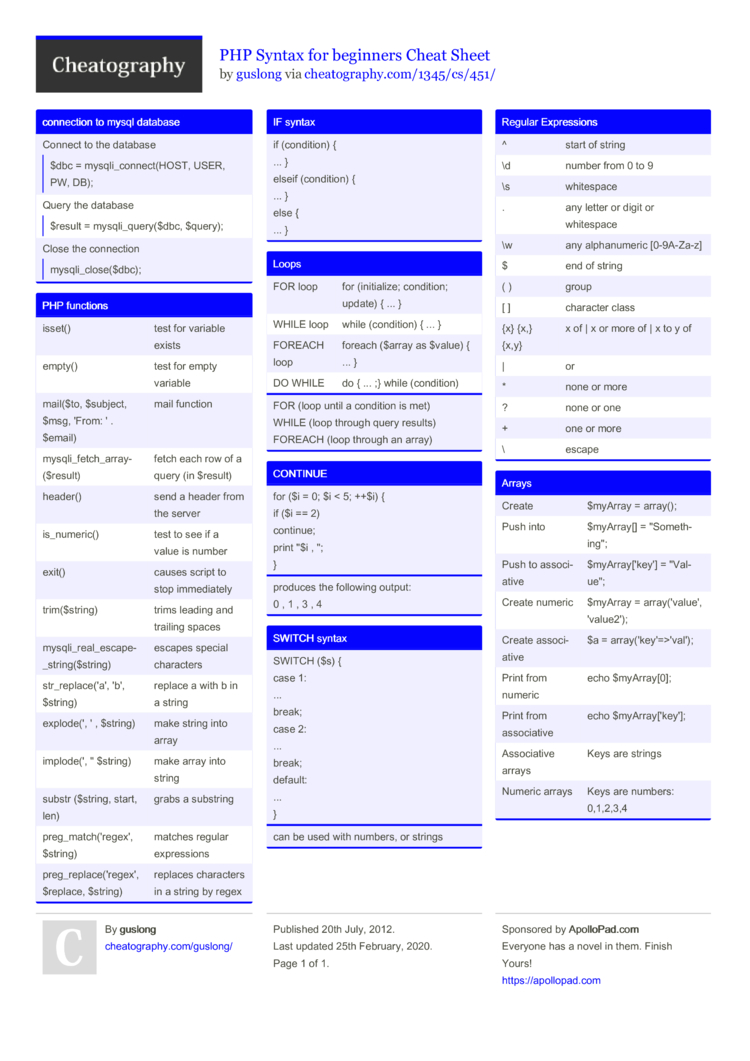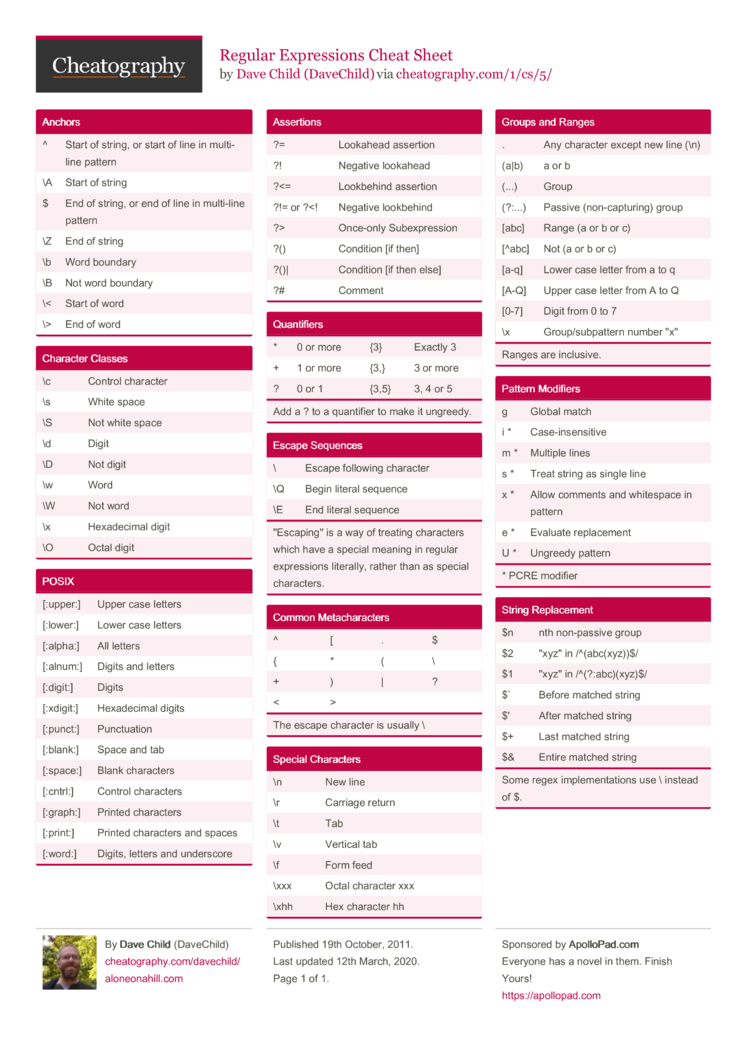Php Regex Cheat Sheet
PHP Live Regex Test PHP regular expressions live in your browser and generate sample code for pregmatch, pregmatchall, pregreplace, preggrep, and pregsplit! — A Live Regular Expression Tester for PHP Tutorials and Regex Database.
- Test PHP regular expressions live in your browser and generate sample code for pregmatch, pregmatchall, pregreplace, preggrep, and pregsplit! — A Live Regular Expression Tester for PHP. Cheat Sheet abc A single character of: a, b or c ^abc Any single character except: a, b, or c a-z.
- We wanted to create short, simple guidelines that developers could follow to prevent XSS, rather than simply telling developers to build apps that could protect against all the fancy tricks specified in rather complex attack cheat sheet, and so the OWASP Cheat Sheet Series was born. This cheat sheet lists a series of XSS attacks that can.
Regular expressions are a very useful tool for developers. They allow to find, identify or replace a word, character or any kind of string. This tutorial will teach you how to master PHP regexp and show you extremely useful, ready-to-use PHP regular expressions that any web developer should have in his toolkit.
Getting Started With Regular Expressions
For many beginners, regular expressions seem to be hard to learn and use. In fact, they’re far less hard than you may think. Before we dive deep inside regexp with useful and reusable codes, let’s quickly see the basics of PCRE regex patterns:
Regular Expressions Syntax
A regular expression (regex or regexp for short) is a special text string for describing a search pattern. A regex pattern matches a target string. Gopro codec for mac. The following table describes most common regex:
| Regular Expression | Will match… |
|---|---|
| foo | The string “foo” |
| ^foo | “foo” at the start of a string |
| foo$ | “foo” at the end of a string |
| ^foo$ | “foo” when it is alone on a string |
| [abc] | a, b, or c |
| [a-z] | Any lowercase letter |
| [^A-Z] | Any character that is not a uppercase letter |
| (gif|jpg) | Matches either “gif” or “jpg” |
| [a-z]+ | One or more lowercase letters |
| [0-9.-] | Any number, dot, or minus sign |
| ^[a-zA-Z0-9_]{1,}$ | Any word of at least one letter, number or _ |
| ([wx])([yz]) | wy, wz, xy, or xz |
| [^A-Za-z0-9] | Any symbol (not a number or a letter) |
| ([A-Z]{3}|[0-9]{4}) | Matches three letters or four numbers |
PHP Regular Expression Functions
PHP has many useful functions to work with regular expressions. Here is a quick cheat sheet of the main PHP regex functions. Remember that all of them are case sensitive.
For more information about the native functions for PHP regular expressions, have a look at the manual.
| Function | Description |
|---|---|
| preg_match() | The preg_match() function searches string for pattern, returning true if pattern exists, and false otherwise. |
| preg_match_all() | The preg_match_all() function matches all occurrences of pattern in string. Useful for search and replace. |
| preg_replace() | The preg_replace() function operates just like ereg_replace(), except that regular expressions can be used in the pattern and replacement input parameters. |
| preg_split() | Preg Split (preg_split()) operates exactly like the split() function, except that regular expressions are accepted as input parameters. |
| preg_grep() | The preg_grep() function searches all elements of input_array, returning all elements matching the regex pattern within a string. |
| preg_ quote() | Quote regular expression characters |
Validate a Domain Name
Case sensitive regex to verify if a string is a valid domain name. This is very useful when validating web forms.
» Source
Enlight a Word From a Text
This very useful regular expression will find a specific word in a string and enlight it. Extremely useful for search results. Remember that it’s case sensitive.
» Source
Enlight Search Results in Your WordPress Blog
The previous code snippet can be very handy when it comes to displaying search results. If your website is powered by WordPress, here is a more specific snippet that will search and replace a text by the same text within an HTML tag that you can style later, using CSS.
Open your search.php file and find the the_title() function. Replace it with the following:
Now, just before the modified line, add this code:
Save the search.php file and open style.css. Append the following line to it:
» Source
Get All Images From a HTML Document
If you ever wanted to be able to get all images form a webpage, this code is a must have for you. You should easily create an image downloader using the power of cURL.
Php Regex Tutorial
» Source
Remove Repeated Words (Case Insensitive)
Often repeating words while typing? This handy case insensitive PCRE regex will be very helpful.
Screencast free for mac. » Source
Remove Repeated Punctuation
Same php regex as above, but this one will look for repeated punctuation within a string. Goodbye multiple commas!
» Source
Match a XML/HTML Tag
This simple function takes two arguments: The first is the tag you’d like to match, and the second is the variable containing the XML or HTML. Once again, this can be very powerful used along with cURL.


Match an HTML/XML Tag With a Specific Attribute Value
This function is very similar to the previous one, but it allow you to match a tag having a specific attribute. For example, you could easily match <div>.
Match Hexadecimal Color Values
Another interesting tool for web developers! It allows you to match/validate a hexadecimal color value.
Find Page Title
This handy code snippet will find and print the text within the <title> and </title> tags of a HTML page.
Parse Apache Logs
Most websites are running on the Apache webserver. If your website does, you can easily use PHP and regular expressions to parse Apache logs.
» Source
Replace Double Quotes by Smart Quotes
If you’re a typography lover, you’ll probably love this regex pattern which allow you to replace double quotes by smart quotes. A similar regular expression is used by WordPress to make the content more beautiful.
» Source
Check Password Complexity
This regular expression will tests if the input consists of 6 or more letters, digits, underscores, and hyphens.
The input must contain at least one uppercase letter, one lowercase letter and one digit.
» Source
WordPress: Using Regexp to Retrieve Images From a Post
As I know many of you are WordPress users, you’ll probably enjoy that code which allows you to retrieve all images from post content and display it.
To use this code on your blog, simply paste the following code on one of your theme files.
Generate Emoticons Automatically
Another function used by WordPress. This one allow you to automatically replace an emoticon symbol by an image.
Table of Contents
- preg_filter — Perform a regular expression search and replace
- preg_grep — Return array entries that match the pattern
- preg_last_error_msg — Returns the error message of the last PCRE regex execution
- preg_last_error — Returns the error code of the last PCRE regex execution
- preg_match_all — Perform a global regular expression match
- preg_match — Perform a regular expression match
- preg_quote — Quote regular expression characters
- preg_replace_callback_array — Perform a regular expression search and replace using callbacks
- preg_replace_callback — Perform a regular expression search and replace using a callback
- preg_replace — Perform a regular expression search and replace
- preg_split — Split string by a regular expression
 steve at stevedix dot de ¶
steve at stevedix dot de ¶Php Replace Regex
Something to bear in mind is that regex is actually a declarative programming language like prolog : your regex is a set of rules which the regex interpreter tries to match against a string. During this matching, the interpreter will assume certain things, and continue assuming them until it comes up against a failure to match, which then causes it to backtrack. Regex assumes 'greedy matching' unless explicitly told not to, which can cause a lot of backtracking. A general rule of thumb is that the more backtracking, the slower the matching process.
It is therefore vital, if you are trying to optimise your program to run quickly (and if you can't do without regex), to optimise your regexes to match quickly.
I recommend the use of a tool such as 'The Regex Coach' to debug your regex strings.
http://weitz.de/files/regex-coach.exe (Windows installer) http://weitz.de/files/regex-coach.tgz (Linux tar archive)One comment about 5.2.x and the pcre.backtrack_limit:
Note that this setting wasn't present under previous PHP releases and the behaviour (or limit) under those releases was, in practise, higher so all these PCRE functions were able to 'capture' longer strings.
With the arrival of the setting, defaulting to 100000 (less than 100K), you won't be able to match/capture strings over that size using, for example 'ungreedy' modifiers.
So, in a lot of situations, you'll need to raise that (very small IMO) limit.
The worst part is that PHP simply won't match/capture those strings over pcre.backtrack_limit and will it be 100% silent about that (I think that throwing some NOTICE/WARNING if raised could help a lot to developers).
There is a lot of people suffering this changed behaviour from I've read on forums, bugs and so on).
Hope this note helps, ciao :-)Php Regex Cheat Sheet
I have written a short introduction and a colorful cheat sheet for Perl Compatible Regular Expressions (PCRE):
http://www.bitcetera.com/en/techblog/2008/04/01/regex-in-a-nutshell/Perl Regex Cheat Sheet
- PCRE
